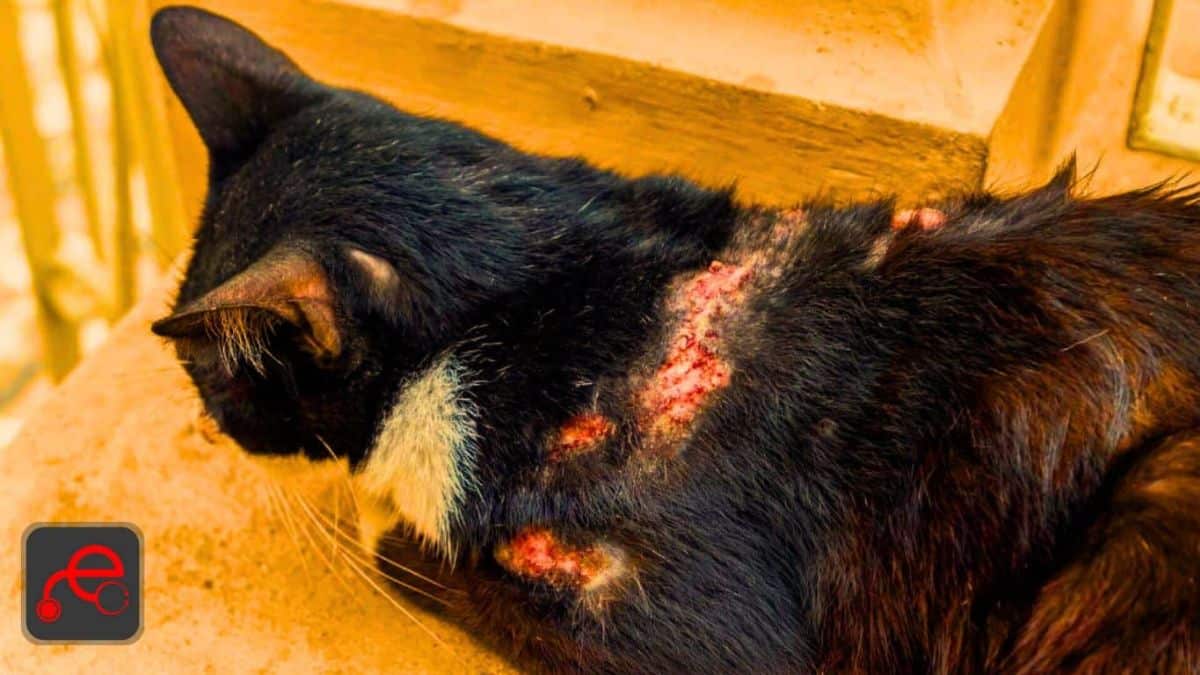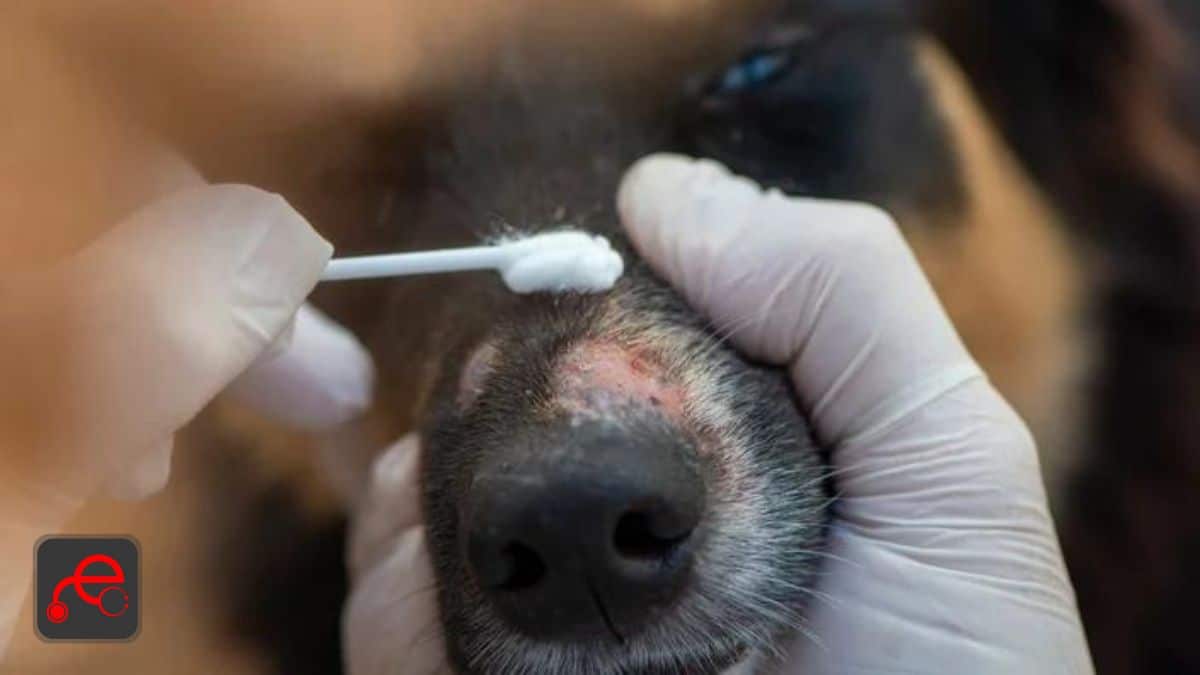How A Cat Gets Ringworms: Symptom & Treatment

Ringworm has nothing to do with the worms as the name indicates. If you notice that your cat is developing certain conditions on the skin it can be the underlying condition, but most probably, it can be the development of a fungal infection called ringworm that is highly contagious. In this article, you know about how a cat gets ringworms and it’s treatment.
As there are so many parasites out there, we can easily put all other worms in the category of parasites such as roundworms, tapeworms, hookworms, and whipworms. As the name indicates, however, ringworm is not an actual worm- it is a fungus. Ringworms cause fungal infections, and this infection is common across the world it usually affects all domestic animals, including cats, and dogs as well. Therefore, the cat’s owners must be aware of the symptoms, causes, and treatment.
Do not worry! You do not know anything about fungal infection. We have got you covered. Let us dig into the details of the fungal infection caused by the ringworms.
What is Ringworm?
Ringworm is called a fungus and it spreads fungal infections across the world including domestic animals such as cats and dogs, ringworm is named ringworm because it appears as bumpy, lesions with a red ring-like appearance as seen in human ringworm infections. Outer skin acts as a host of this fungus; it lives and grows on the outer layer of the skin, and in the follicles of hair in all domestic animals and cats. Sometimes, it is also found in the nails. Cats that have weak immunity are at a higher risk of gets ringworms.
Outbreak of the Ringworms in Cat:
Through direct contact with the cats with fungus, this fungal infection caused by the ringworms spreads. It is also contagious, this direct contact occurs when the cat is exposed to an animal that is already suffering from the fungal infection caused by the ringworms. On the other hand, your cat gets ringworms when it touches any object or person that is contaminated with the infection such as toys, chairs, tables, bedding, or carpets.
Symptoms of the Ringworm Disease:
However, ringworm is not a serious and life-threatening condition; it can be properly treated and cured with the help of a proper diagnosis by the vet. Nevertheless, this disease is highly contagious and can multiply from one object to another in minutes, so it is necessary to involve a vet in the treatment of this fungal disease to control the outbreak of the infection.
If your cat gets ringworms, there is an appearance of hair loss throughout the body in circular patterns, as they dilate these lesion-prone areas may start to heal from the center, and that will create a patchy appearance, they may become red and inflamed.
The ringworms do not cause itching. The hair follicles that are affected can become soft and brittle, and they can be easily breakable. Through that fallen hair that becomes contaminated from the infection, the spread of infection can speed up in homes, and others will get this infection easily.
These are the symptoms of ringworms in cat:
- The circular appearance of hair loss
- Dandruff in cat’s fur
- Soft, brittle, and dry hair
- Inflamed skin
Changes in the appearance of the fur, hair loss, and red inflamed skin can be an indication of other signs as well. A skin problem has an association with many other skin conditions.
Treatment for Ringworms in Cat:
There is a diagnostic test for the confirmation of the ringworms in cat as well as there are many physical tests for the diagnosis of the ringworm infection that are being performed efficiently by your vet. For a fungal culture, he will take a sample of the cat’s skin or the patch of hair follicles and he will send it to the lab for the performance of the test, and it will be examined under the wood lamp that has ultraviolet radiations for the detection of the fungal infection.
There are three steps for the treatment of ringworms.
- Topical treatment
- Oral medications
- Decontamination from the environment
Topical Treatment for Ringworm:
When Your cat gets ringworms, vet will treat the fungal infections by using anti-fungal creams, ointment, or lotion. He also prescribes anti-fungal shampoo to prevent the outbreak of the disease and to control the disease. They also suggest shaving the cats from the affected areas, also the long hair of the cats should be tied properly to prevent the spread of the infection. It may take several months for the topical treatment to eliminate the infection.
Oral Medications for the Ringworms?
Oral medications are used for ringworms in cat that the combination with topical therapy. Anti-fungal oral medications are used to treat fungal infections. Medicines are administered to the infected cats for six months. It is necessary to keep the treatment ongoing until all the infection is cleared.
Cat’s Health and Nutrition:
The proper focus should be placed on the dietary patterns of the cats to control the symptoms from getting worse, you should keep your cats away from spicy food that can aggravate the symptoms, and there should be the presence of anti-inflammatory food in the diet. There are many cat foods on the market that makes the symptoms of ringworms in cat worse as they induce inflammation in the body, causing the appearance of lesions to make more inflamed and red.
Preventing Ringworms in Cat:
Many owners do not know the presence of the ringworms until one of their pets gets the infection. The only way to prevent ringworm is to decontaminate the environment and fully cleanse the environment in which their pets are living.
It is necessary to keep the animal that has been infected with the infection in a separate room, you should keep them clean. You should tie their long hair all the time to prevent the spread of infection.
Consult your doctor as soon as you notice all the symptoms in the animal to prevent the infection in other animals.
Additionally, you should be decontaminating your home. You should vacuum your carpets every time to eliminate the spread of the infection; the hard floors should be mopped on the regular basis.
Conclusion
Ringworm is a common fungal infection that can affect cats of all ages and breeds. It is typically spread through direct contact with infected animals or contaminated objects, and it can cause a variety of symptoms, including circular, scaly, or crusty skin lesions, itching, and hair loss. Treatment for ringworm in cats typically involves a combination of topical and oral antifungal medications, along with environmental management to prevent re-infection. With proper diagnosis and treatment, most cats with ringworm can make a full recovery within a few weeks to a few months. It is important to consult with a veterinarian if you suspect that your cat has ringworm or any other skin condition.
FAQs
Q: How do cats contract ringworms?
A: Cats can contract ringworms through direct contact with an infected animal or object, such as a contaminated grooming tool or bedding and cat gets ringworms.
Q: Are certain breeds of cats more susceptible to ringworms?
A: While affects ringworms in cats of all breeds, some breeds may be more susceptible due to genetic factors or underlying health conditions.
Q: What are the symptoms of ringworms in cat?
A: The symptoms of ringworms in cats may include circular, scaly, or crusty skin lesions, itching, and hair loss.
Q: How are ringworms in cats diagnosed?
A: Ringworms in cats is typically diagnosed through a combination of physical examination, skin scrapings, and fungal cultures.
Q: How is ringworms in cat treated?
A: Ringworms in cats is typically treated with a combination of topical and oral antifungal medications, along with environmental management to prevent re-infection.
Q: Can cats with ringworm infect humans?
A: Yes, ringworm is a zoonotic infection that can be transmitted from cats to humans, and vice versa.
Q: Can cats with ringworm infect other pets in the household?
A: Yes, cats with ringworm can infect other pets in the household, so it is important to isolate and treat infected animals and thoroughly clean and disinfect the environment.
Q: Can ringworms in cats cause serious health problems?
A: In most cases, ringworms in cats is a mild and self-limiting condition that can be easily treated. However, in rare cases, severe or chronic ringworm infections can lead to secondary skin infections or other health complications.
Q: Can ringworms in cats be prevented?
A: Ringworms in cats can be prevented by avoiding contact with infected animals and contaminated objects, keeping cats clean and well-groomed, and providing a healthy diet and lifestyle to promote a strong immune system.
Q: How long does it take for a cat with ringworm to recover?
A: The length of time it takes for a cat with ringworm to recover depends on the severity of the infection and the effectiveness of treatment. With appropriate treatment, most cats with ringworm can make a full recovery within a few weeks to a few months.
Q: Can ringworm in cats be transmitted to other animals besides cats and humans?
A: Ringworm can be transmitted to other animals besides cats and humans, but it is less common. Dogs, horses, and rodents are among the animals that can be affected by ringworm.
Q: Can indoor cats get ringworms?
A: Yes, indoor cats can get ringworms if they come into contact with infected animals or contaminated objects.
Q: Can kittens get ringworms?
A: Yes, kittens can get ringworms, and they may be more susceptible due to their weaker immune systems and increased likelihood of close contact with infected animals.
Q: Is ringworm contagious to humans?
A: Yes, ringworm is contagious to humans and can be transmitted through direct contact with infected animals or objects.
Q: How long does ringworm live on surfaces?
A: Ringworm can live on surfaces for several months, so it is important to thoroughly clean and disinfect any surfaces that may have come into contact with an infected animal.
Q: Can ringworm in cats cause hair loss?
A: Yes, ringworm in cats can cause hair loss, along with other symptoms such as circular, scaly, or crusty skin lesions and itching.
Q: Can over-the-counter antifungal creams be used to treat ringworm in cats?
A: No, over-the-counter antifungal creams are not safe or effective for use in cats and should only be administered under the guidance of a veterinarian.
Q: Can ringworm in cats go away on its own?
A: While mild cases of ringworm in cats may go away on their own, more severe or chronic infections will require medical treatment to resolve.
Q: Can cats be carriers of ringworm without showing symptoms?
A: Yes, cats can be carriers of ringworm without showing symptoms, which can make it difficult to identify and control the spread of the infection.
Q: Can ringworm in cats be prevented through vaccination?
A: No, there is currently no vaccine available to prevent ringworm in cats.




